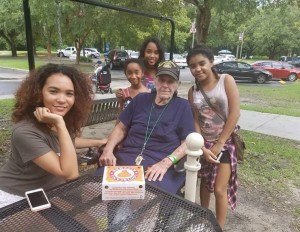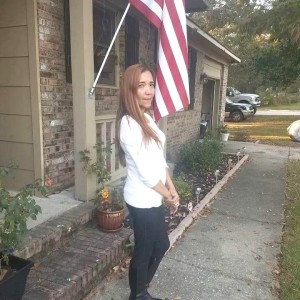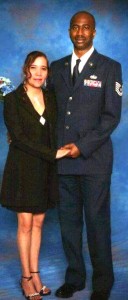A stranded American finally goes ‘home’ to the US
SAN FRANCISCO — Florence Babylyn Hippe Sands, 44, of Fort Bragg, North Carolina did not know she was an American citizen by birth until she was 18 years old.
A few weeks before she turned 18, Florence received a notice from the US Embassy that she would no longer receive monthly financial support. She and her mother went to the Embassy but did not have to pass through the stringent security measures for the usual visa applicants. Her mother spoke in whispers with a tall white guy. They were asked to come back after a few days.
Florence did not know what was going on. When they came back to the US Embassy after a week, she was asked to sign some documents, she paid $65 and was issued an American passport. The tall white guy told her mother that it was now the time to claim Florence’s citizenship and all the benefits that an American could have.
It finally dawned on her that she was an American who had been stranded in the Philippines for a long time. It was now time to go to “home” to a country she barely knew.
Florence’s mother married Robert Charles Hippe, a Vietnam War veteran, in the Philippines on July 17, 1970.
“I was four years old when my dad left to re-enlist (according to Mom). He promised to come back but never did. No calls, no letters as far as I know, instead, we received checks from the US Embassy every,” recalls Florence.
One-way ticket and a $20 bill
In July 1994, with the help of her mother’s friend, Florence was able to raise money for a one-way ticket to Chicago. She had a layover in San Francisco. Confused where to go next, she was fortunate to talk to an elderly Filipina who had lived in the US for many years. Knowing her predicament, the woman helped

Florence’s children with their grandfather, Robert Charles Hippe, during a visit to Florida. CONTRIBUTED
her find the gate bound for O’Hare Airport. She even gave Florence a $20 bill. Although, a bit embarrassed, Florence profusely thanked the lady because she did not have any money. The woman left without telling her name. Until now, Florence still wonders where she is.
“I had mixed feelings. It was my first time to travel. I was wondering if I would I survive without my mother,” Florence says.
Florence arrived in Chicago and temporarily lived with her mother’s friend. Her mother’s friend and her husband own a company and a warehouse where Florence started working. When she earned enough money she paid the friend and lived on her on. It was then that she began looking for her father.
You are my “sunshine”
“I first spoke to my dad in 1995 after finding his name in a telephone directory. He invited me to come visit him in Florida,” Florence recalls.
Florence went to Florida. She had mixed feelings for a man she had seen only in pictures. But in the end the love between a daughter and her father prevailed despite the long years of absence. When Robert Charles Hippe saw her, he said, “You are my sunshine.” All the heartaches and longings vanished as they hugged each other.
“I was not yet good in English then and a little bit shy. I talked mostly to my grandma. She was very glad to finally meet me. I did not ask my dad why he left. I was satisfied that I finally met him. I found out that I was the only child. My dad never got remarried. I asked him why he did not marry, he said because he still loves my mom,” Florence says.
Florence’s mother passed away in 2011, but her father has not remarried and lives alone in Florida. Many times he asked Florence to stay with him, but she refused. She wants to live independently.
Her mother did not follow her to the United States. Florence never demanded explanations from her mother. She silently accepts her fate because she thinks that the most important thing is finding her father. They communicate regularly and spend vacations in Florida and North Carolina with her daughters.
“I am an American”
Florence “looks” like an “American,” but speaks with a heavily accented English. Many Filipinos she meets are surprised that she is an American citizen. Questioning looks often follow. This has made her more timid, trying to be invisible to other Filipinos.
She also experienced discrimination on her job as a shift manager at Dollar General because Americans mistook her for a Mexican. As a manager on duty, she handled complaints but Americans did not want to talk to her, wanting to deal instead with a “real” American. After some time, Florence taught herself to speak and act like a native.
Eventually, she was able to gain confidence. Now she works at Embassy Suite by Hilton and has learned how to stand up for herself. But her experience brought back bitter memories of when she was growing up in the Philippines.
“I was treated differently by my mom’s family. I felt like I wasn’t welcome because I did not have a father. Cousins would always ask how come I did not have a father. I really didn’t know how to answer them. I knew I was different when people asked me about my hair color and called me tisay,” recalls Florence.
Ohana
In 1996, Florence met her husband, David Ryan Sands, an Air Force serviceman, while in Hawaii. They have been married for 11 years and blessed with four daughters. Florence raises her daughter on Filipino ways, like eating Filipino food, “mano” and eating with their hands. The Sands family went home to the Philippines for the first time in 2011 when Florence’s mother passed away.
“In my heart I still value being a Filipino. I am proud to be a Filipino even though I adopt the American lifestyle. I am still longing for the lifestyle I used to have,” Florence says.
To her fellow Amerasians left in the Philippines, Florence says:
“Do not give up hope. Know your rights. Someday you will all gain what you are hoping for– finding the missing part of your life. That is your father’s and your heritage as Americans. You are my ohana. We are families. Ohana means nobody left behind. Keep on fighting for your birthright.”









